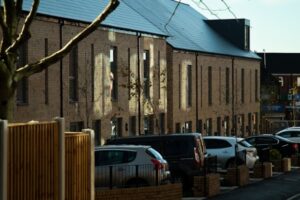Today’s Cities Outlook 2015 event raises some important questions around the growing inequalities between and within cities in the UK. Unless recognition of these inequalities becomes a more explicit component of the cities agenda, things are only going to get worse.
In spite of political commitments, over the last ten years the gap between cities in the south and the rest of UK has increased. The gulf in job creation is perhaps the biggest concern from a poverty perspective, with the south (12.4%), far outstripping jobs growth elsewhere (0.9%).
The metro mayor deal for Greater Manchester represents an exciting step forward for city devolution. But what about places with weaker economies, without a long history of partnership working, who aren’t so well connected to Whitehall – the usual suspects of Sunderland, Grimsby and Blackpool?
Inequalities within cities are also growing. Outlook highlights the squeeze on living standards – wages, in relation to prices, are still 12.6% lower than at start of 2008. Our own research shows that three-fifths of people moving from unemployment into work over the last year are paid below the living wage and that only one fifth of low-paid employees have progressed from low-paid work over the last ten years.
Outlook emphasises that cities must ‘be at the heart’ of 2015’s political debate around supporting growth and reducing the deficit. Cities should put reducing poverty and inequality at the heart of political debate. These objectives need to be more explicit, otherwise we risk falling back on flawed trickle-down economic policies, and taking short-term decisions on local public services driven by cost-cutting imperatives.
If we are to avoid the development of two-tier city regions, we need a more proactive and joined-up approach to local labour markets. Cities need better strategies for targeting training and jobs at out-of-work households. They need to support progression for low-paid workers.
Greater devolution should help with much of this – reducing duplication, fostering a more joined-up approach and tailoring local policy to local needs. But there is a danger that cities obsess about more powers, structures and funding and lose focus on what can be done in the here and now, missing the opportunity for genuinely rebalancing our economy and creating more equal places to live.

















Even Manchester has stark within city region inequalities that two decades of regeneration have failed to shift. Given that trickle down is as suspect regionally as nationally, just how will new approaches acknowledge and tackle this issue?
Good point Mike — an argument I’m always making in my own hometown of San Antonio, Texas. “Success” is always couched in “metro” terms, which spans over 100 miles, but we rarely have an accounting or transparency for the city itself, especially with an annual budget of $2.3 billion. The paradigm continues to be one where pro business development — commercial real estate, architects, developers, marketers, etc. — dominate the urban agenda in the name of “economic development”, by which they mean business development, not understanding that “economic development” is a public sector term, meant to address enduring socioeconomic challenges. Where is this voice & urgency at the deal-cutting table?
Success must become defined by human capital outcomes, not business development outcomes. What policy or planning leadership group can counter the prevailing “business development” dogma, which has hijacked legitimate public sector objectives? Too many questions, but no one to answer them honestly.
Welcome insistence on the urgent importance of inequality on the cities agenda. A crude form of economics has long dominated the cities and regeneration agendas in the UK. At the pinnacle of all this is London as the supposed success story that the other UK cities are chastised for not doing enough to emulate. This is as much a cultural problem as an economics and/or political one. The UK’s elites over-whelmingly have a metro-London lived experience and perspective. Incidental little evidences of this would include the execrable Mind the Gap – London and the Rest on BBC TV a few months ago. There was much pontificating about London’s success with bright young cheery things in the creative industries etc. (no mention of its searing and worsening inequalities). Then the first scenes of ‘The North’ were, surprise , surprise, old derelict mills. Another example was the publication of a RSA Commission report ‘Unleashing metro growth….’. This was initially billed as about stimulating London type growth in other UK cities. It was launched in… London. Some of the text in the report is about not being a threat to London and overall the authors say the report is about economics only. Two points on those ‘economics’. Firstly it’s troubling that inequality is not at the core of any major debate on UK cities. Secondly, it legitimises the ‘London success’ narrative as it focuses purely on the business and commercial, and excludes the social (such as acute and widening inequalities in wealth and income being actually generated by the so-called success.
So again a welcome to this article insisting that inequality must be explicit in the cities agenda.
English cities need devolution and democracy. The latter first.
We have ridiculous powerless one-party states, where there is no accountability and no scrutiny – this is why we get Rotherhams. The metro-mayor idea may seem like devolution, but it is the outdated “strong leader” model the English are culturally wedded to. We need better change than this. PR for local authorities, devolution of powers including tax raising, to make local government a place worth campaigning for representation in.